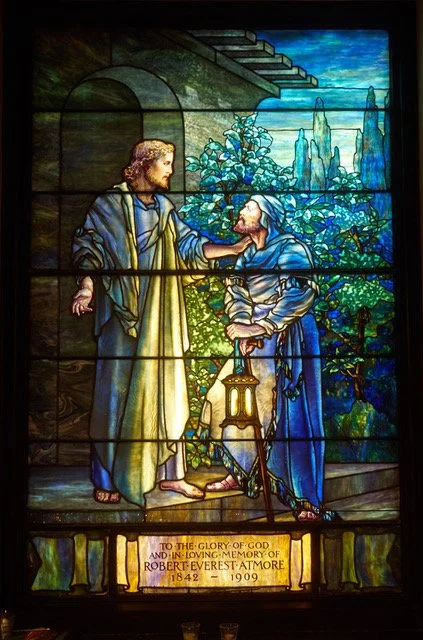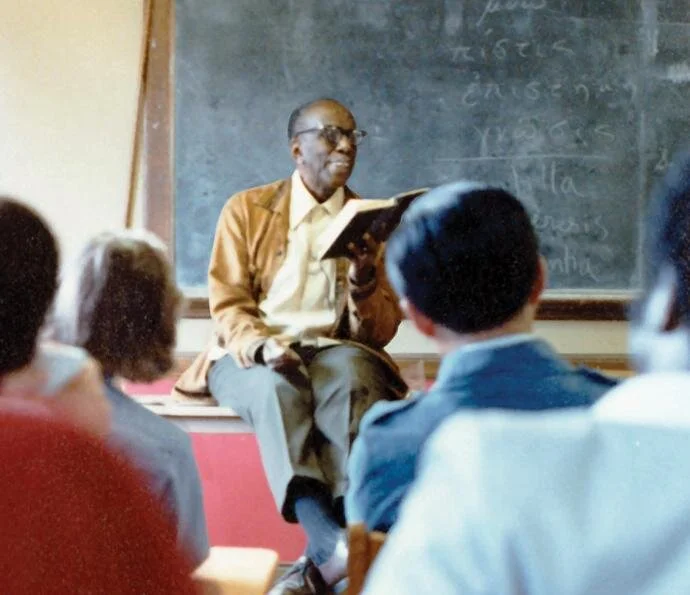Friday Reflection: To be a Priest–Revisiting Alexander Crummell (1819-1898), Part II
“It is only by closing the ears of the soul, or by listening too intently to the clamors of the sense that we become oblivious to utterances. ”
View Alexander Crummell’s biography here
I. Last week’s reflection, Part One, on Alexander Crummell, ended with two events: his ordination to the Episcopal priesthood in 1844 and his “interview” with the Bishop of the Diocese of Pennsylvania, Henry Onderdonk, when he was told that should he wish to become a priest in the Diocese of Pennsylvania, he could not take part in the Diocesan convention nor could any Negro parish he might establish have representation in that convention. Translation: You’re welcome here but not really because, as a Negro, you cannot fully participate as priest of the Diocese. Here is yet another example of something we mentioned last week: W.E.B. Du Bois’ statement that “there was little scope for black priests.”
II. We need to go back in our narrative to the period when Crummell was a student at the Oneida Institute where there are several things worth noting. First of all, it was at the Institute that Crummell became active politically, speaking out against slavery and racism and began a “career” as a public thinker. So prominent had he become that Crummell was invited to be a keynote speaker at the Anti-Slavery New York State Convention of Negroes at its meeting in Albany (NY) in 1840, just after Crummell graduated from the Oneida Institute. Second of all—which we addressed last week—was Crummell’s decision to become an Episcopal priest and apply to the General Theological Seminary in New York City. Thirdly, and this is curious, Crummell was married in 1841 to Sarah Mabitt Elston, and yet, throughout his life, he never spoke or wrote about his marriage or his wife. Sometime after the marriage, Crummell and Sarah moved to Boston when Crummell was accepted in the Diocese of Massachusetts as a candidate for the priesthood and began his program of study.
III. It is useful to remember that as Crummell was “Reading for Holy Orders,” instead of attending a seminary (as noted, he had been rejected at General Theological Seminary because he was Black) so he was required to meet with individual priests and lay faculty, often at Yale University. At the same time, he was “interning” in different parishes in the Diocese, one of which was Christ Church, in Providence where he was called to be a “Lay Reader.” Things did not go well at Christ Church where an emerging insensitivity and intolerance began to take shape which led to a mutual dissatisfaction, something that became a constant in Crummell’s life. Nevertheless, by 1842, Crummell was ready for ordination to the Diaconate and after two more years, ready for ordination to the priesthood, which took place in Philadelphia in 1844 because Crummell and his wife, with the blessing of Bishop Griswold (Diocese of Massachusetts), had come to Philadelphia to establish a Mission parish for African Americans.
IV. Crummell was required to present his credentials to the other Bishop Onderdonk. It would seem that the time in Philadelphia carried with it many miseries, including poverty, hunger, ill health and racial discrimination, all of which would be a constant presence in the Crummell’s life. What Bishop Onderdonk said to Crummell amounted to a refusal to offer him full recognition in the Diocese, so eventually, Crummell gave up his efforts to build a mission church. What surfaced in Providence seems to have been his pastoral way, especially in preaching, in which he focused primarily on the intellect and not on the emotions—an approach that would seem to mirror Crummell’s approach to his own faith. His manner was, on the one hand, brisk and, on the other hand, very labored. During the time he was in Philadelphia he became politically involved and joined the movements for equal suffrage and the abolition of slavery. Nevertheless, Crummell became depressed and tired of doing battle with the Diocese of Pennsylvania and its Bishop. It was time to go.
V. With Sarah, Crummell returned to his native New York City to become the Rector of the African-American parish, the Church of the Messiah (1837), the second Episcopal Church for colored in New York City. Again, the congregation was small and poor. And again, Crummell was quickly at odds with his small band of parishioners because of his intellectual approach to the faith and because, in his often stern way, he gave his parishioners the impression that he believed they were not living moral enough lives; that they were not quite up to his standards. Here, I think, it is time to acknowledge to that even at 26 years of age -such a young man!-- after a number of direct and indirect challenges and setbacks, Crummell had become something of difficult person, though one wise enough to realize that he could not sustain his vocation, and the emotional conflicts that came with it, without a huge human cost. Indeed, Alexander Crummell was a complicated and conflicted holy man. And he began to wonder whether the priesthood was his true calling, after all. A pattern was already developing, what I would described as a “failure of leadership.” A Rector of an Episcopal parish is meant to be a leader, which is not the same thing as a critic. Crummell seemed confused about this.
VI. Again, it was time to move on. With the help of some friends in the faith and, later, some English evangelicals, he and Sarah decided it was time to find rest and restoration and perhaps raise some money for his little congregation in New York City. Crummell decided to travel to England, a destination that seemed for him like going home in the faith. Crummell and Sarah and their little family left for England in late 1847.
VII. Crummell had this to say about coming to England: I do indeed thank God for the providence that has brought me to this land, and allowed me, for once in my life, to be a freeman. Oh the acquisition to one’s heart, mind, and soul—the consciousness in all its fullness that one is a man! I never had it before I came to England. I used to think I had, but now I know. (Moses biography, p. 54) The time in England began as a time of solicitation of funds for his Church of the Messiah congregation and Crummell was “full of earnest purpose and bright hopes.” (quoted in John Twigg, “History of Queens College Cambridge”) Through introductions from his supportive American friends, Crummell made contact with politicians, literary figures, and clergy. And since Crummell went to work lecturing and preaching upon his arrival in England, he was received graciously and respectfully wherever he went. His efforts produced the equivalent of $8000 for his parish in New York City, a considerable amount of money at that time.
VIII. The cost of his success, however, was quite high physically and emotionally as Crummell, in his own words, fell into “fits of illness.” Both his American and English friends suggested that he “should retire for a season from over-work. This pattern of working himself into exhaustion, a product of internal conflict and often (as in New York and Philadelphia) of powerful external encounters of rejection and mistreatment, would become a pattern in Crummell’s life. In fact, from this time forward, both Crummell and hie wife, drifted in and out of illnesses, some of them serious.
IX. English friends, Anglican laypeople and clergymen who were part of the Evangelical movement, suggested that Crummell seek an admissions interview for Queens College Cambridge, something Crummell himself had been thinking about. Crummell took the interview and was admitted, beginning his academic work in the fall term of the 1849-1850 academic year where he read for the four-year BA pass degree. There is some suggestion that this degree program was not a very demanding course of study which may or may not be true. What is true is that the course of study WAS demanding for Crummell because as a now 30-year-old Episcopal priest with a family, serving as a Curate in a small Anglican parish (in Ipswich, Suffolk England) and with his activities in the Evangelical anti-slavery movement which involved preaching and giving lectures all over the country, all with trying to stay afloat financially, it was difficult for him to manage everything. And thus, once again, came the “fits of illness.” Crummell describe this latest bout: “I was often in the hands of doctors. Not seldom I fell into a state of discouragement and despair, on account of my health. Now and then my studies were interrupted.” (Twill, op.cit) It is also important to note that during Crummell’s time at Cambridge, one of Crummell’s three children, their son, was killed in an accident. But Crummell persevered and in the spring term of 1853, he was awarded his degree and became the first Black graduate of Cambridge University. The lingering cloud, however, was his health. Finally, Crummell’s physician insisted that he move to a warmer and dryer climate. Somehow, everything came together, including the difficulties in Providence, and Crummell decided to relocate to Liberia, the Negro Republic of West Africa and he applied for status as missionary in the Episcopal Church. He was 34 years old and starting over once again.
X. For Crummell, going to Liberia was an opportunity to be part of shaping the country’s life and culture. He wanted help create a black African country. Ironically, Crummell came to Liberia as a missionary of the Episcopal Church and was responsible to the Missionary Bishop, John Payne, with whom almost from the beginning, he was at odds. The goal of his work was to Christianize the native Africans, to “civilize” the country, and to renew his commitment to evangelization and education. Unquestionably, Crummell was seeking a new freedom to be a priest, evangelist, and educator without constraints, especially the discrimination that he had persistently faced in his life. He travelled throughout the country and established several new mission churches. Together with the prominent Liberian educator, writer, journalist and politician, Edward Wilmot Blyden, Crummell became a widely-known spokesperson for Liberian nationalism. Along the way, Crummell headed small schools and in 1861, together with Blyden, was appointed a member of the faculty of the new Liberia College. Not surprisingly, in 1866, Crummell was dismissed from his faculty position because of longstanding unresolved conflicts with the college administration. In 1867, Crummell land his family moved to Caldwell township, where he founded a school modeled on the Oneida Institute, established another Episcopal church and served two mission parishes. By the early 1870 political unrest was dangerously wide-spread in Liberia and in 1873, Crummell and his family decided to return to the United States.
XI. When Crummell fled Liberia, he was 54 years old and not a little battered. He and his wife were frequently ill and financially unstable much of the time they were in Liberia. Again, perhaps providentially, he was called to Saint Mary’s Mission for Colored People, the “Black branch” of the white Episcopal church, Saint John’s, in Washington, D.C. Within a very short time, Crummell had increased the size and activities of the Saint Mary’s congregation and in 1875, he and members of the congregation left Saint Mary’s to found Saint Luke’s, the first independent black Episcopal church in Washington. A new church designed after an Anglican church in Coventry, England was commissioned in 1876 and complete in 1880 (Crummell considered himself a “High Church “Episcopal priest). It is not an exaggeration to say that Saint Luke’s was perhaps where Crummell always wanted to be, though I’m not sure he ever fully realized this. It certainly is where he did his best work as a priest. It was also a place where he endured the death of his wife Sarah in 1878. Unlike many of Crummell’s other positions and callings, he was Rector of Saint Luke’s for nineteen years, from its founding in 1875 to his retirement in 1894. For the Centennial Celebration of the Diocese of Washington, D.C., (1896-1995), the parishioners of Saint Luke’s contributed a brief history on the founding of Saint Luke’s with special attention given to Alexander Crummell. One comment is especially important: Alexander Crummell’s gift was “his belief in the goodness and greatness of his people [which was] his legacy to all of us.” (cf. “About Saint Luke’s Episcopal Church”
XII. Not unexpectedly, Crummell was very busy in his retirement. He taught at Howard University from 1895-1897, and with W.E.B. Du Bois and other black intellectuals, founded the prestigious American Negro Academy 1897. Crummell wrote and published a great deal, lectured and traveled widely, and stayed active in groups like the Conference of Church Workers among Colored People/Union of Black Episcopalians, right up to the time of his death in September of 1898.
XIII. As I come to the end of this second reflection on Alexander Crummell, I have reluctantly concluded that after all the reading and thinking—and praying—I have done, I really don’t know Crummell. I know all the things he was—very gifted, ambitious, often self-righteous, severe, combative, rigid, sometime mean-spirited, brilliant, long-suffering, very complicated and troubled, faithful and of great moral character, exceedingly productive, a tireless worker, a lousy preacher, an intellectual, and endlessly unpopular with those he served, what my father would calI “eminently unlikeable.” Was Crummell God-fearing? Did “fall into the hands of the Lord”? ( Sirach 2:18). I don’t know. I do. though, believe he was a good priest and meant to be always, even though “being a priest” was often very hard for him. In the same way, he meant to be a good leader., but as we have seen, conflict was always one of the elements of his leadership style and ending up in conflict was usually Crummell’s doing. But so often he got in his own way and struggled mightily as a result. All the while, however, he tried to live and labor for Christianity and preach the dignity and worthiness of Black people.
XIV. In this time of Covid-19 and Black Lives Matter, perhaps we can look at Alexander Crummell as someone we could be inspired by, and someone who could help us to see ourselves as we are. As someone we could emulate because he kept going and, in spite of himself, accomplished so much. And perhaps we could pray with Crummell and the Psalmist, Let the words of my mouth and the meditation of my heart be acceptable in your sight, O Lord, my strength and my redeemer (Psalm 19, v. 14)
Amen
—Father Peter Kountz










